After reading this article, you will know how to:
- Audit the visibility of your show
- Spot the low-hanging fruits that you’re missing out on
- Define a precise action plan to rapidly make significant visibility gains
Podcast visibility definitions
Before we walk you through the exact process we use to audit and improve the visibility of a podcast, we need to define a couple of terms that you will see used often in this guide. If you are already familiar with the vocabulary of search engine optimization, feel free to skip to the guide.
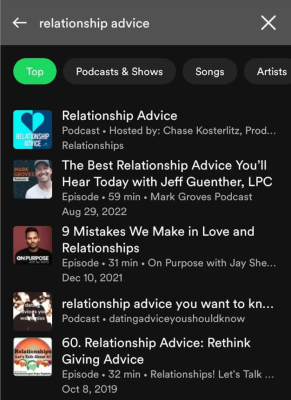
Keyword: when people look for new content in their favorite podcast app, they will oftentimes type words or phrases in the search bar. For instance, they might type something like ‘relationship advice’. These words and phrases are called keywords.
Search results: the suggestions made by a podcast app. Here are the search results for the keyword ‘relationship advice’ on Spotify
Rank/ranking: the position of a suggestion made by the podcast app on the result page. In our example, the show called Relationship advice ranks #1, etc.
Search volume: how often is a word or phrase typed by users in the search of a podcast platform in a given month? The more a keyword is searched, the higher the volume. To find out the search volume of a keyword head over to our keyword explorer.

Metadata: a technical term referring to the various pieces of information about your show that you feed to podcast platforms via your RSS feed (e.g the show’s title, author, etc.). Podcast metadata is a crucial ranking factor. So much so that an indie podcaster with a small audience but properly optimized metadata can outrank an established show with poorly optimized metadata. Check out our ultimate guide on how to optimize your podcast metadata for more information.
Tags: a fancy way to refer to the different elements that make up the metadata.
Keyword difficulty: if you optimized the metadata of your show to rank for ‘relationship advice’, how difficult would it be to claim one of the top spots? Keyword difficulty is rated on a scale from 0 to 100
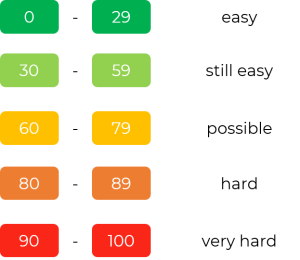
Keyword difficulty is influenced by 3 major factors:
- the number of shows that include your target keyword in their podcast metadata
- the download volume of these shows
- the rating and reviews of these shows.
As you can see in the image below, ‘relationship advice’ is rated 69.2, which means it is not too competitive. With the right adjustments to your podcast’s metadata and a bit of patience, your show has a decent chance to start ranking for that keyword.

Visibility: the visibility score of your show is calculated by taking the search volume of all keywords your show ranks for and then factoring in your ranking for each of these keywords.
How to audit and improve the visibility of your show
Don’t you hate it when an article about marketing gives you advice that is not wrong but also too vague to be really actionable?
Me too. That’s why I’m going to use a real podcast to outline the auditing process. This way you’ll be able to follow along and reproduce the steps autonomously with your own show.
Moni Millares, the creator behind the show Mind of Success volunteered to get a public visibility audit from us.
Ready? Let’s go!
Step 1: defining the first set of target keywords
You need to start by asking yourself these fundamental questions:
- what is my goal with this podcast?
- how do I plan to monetize my show?
- what is my niche?
When Moni launched her show in March 2021, her goal was to learn and challenge herself to consistently put out content. She’s covered a wide array of topics such as personal development, career, financial freedom, mental health, inclusiveness, fintech, women’s empowerment, entrepreneurship, fitness, holistic health and more.
While these topics are great and are a reflection of her unique personality, the sad truth is that it is not possible to rank well for all of these keywords. The reason for this is simple: to rank for a competitive keyword, you have to include it in the most important tags (show title and author).
On the other hand, stuffing all of your keywords in your title tag makes you look spammy to listeners and will probably get you into trouble with Spotify or Apple down the road.
What should Moni do then?
I asked her to take the time to decide what topic is most important to her moving forward. As Mind of Success is maturing, Moni has come the realization that she wants to put the focus on helping women break into or advance their career in Fintech.
Here’s why I love it:
- Niching down: focusing on a topic this specific makes it easier to establish your show as the reference in your niche
- It plays to her strengths: she’s climbed the ladder as a woman in the finance industry and can deliver invaluable insights to her listeners
- Monetization: though the size of the target audience is rather modest, she can monetize it very well with coaching and sponsorships from recruitment firms and companies in the space who want to attract diverse talent.
- Shooting for the stars: if Moni changes her show title to ‘Mind of Success – Fintech career advice for women, the presence of the word ‘fintech’ will automatically give her a shot at ranking for ‘fintech’, which has a much higher search volume and is still relevant to her niche.
Now, this is not to say that we’re completely giving up on other keywords. We will include them in our metadata but in less important tags such as the show description and episode titles where applicable. We have to be realistic about our chances to rank well but it would be a pity not to give it a try.
To conclude this section, here’s a summary of the keywords we are going for:
- Primary keyword: Fintech career advice for women (tags: show title and author tag):
- Secondary keywords: personal development, mindset, success, career, women in business, financial freedom, mental health, inclusiveness, women’s empowerment, entrepreneurship (tags: show description, episode titles, and descriptions when the topic of the episode fits)
💡 This first set of keywords is not set in stone, we will refine it as we go. If you’re following along and you are not sure what your set of target keywords should be, then head over to our guide on how to choose the best podcast keywords or go directly to step 2 as spying on your competition is a good way to kickstart your keyword research process.
Step 2: trimming our list
At this stage, we are going to trim our set of keywords to only keep high-potential keywords. Looking at the quadrant below we only want keywords in the sweet spot and the gold pan.
- Sweet spot: keywords with high search volume but low difficulty
- Gold pan: like gold panners, we’re going to sift through keywords with low volume and low keyword difficulty to find the gold nuggets that are highly relevant to our topic, ideally with monetization potential.
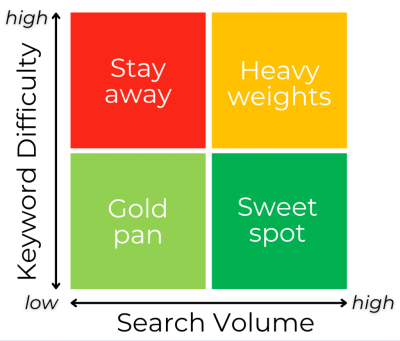
After entering all of Moni’s keywords in our keyword explorer, I get the following results:
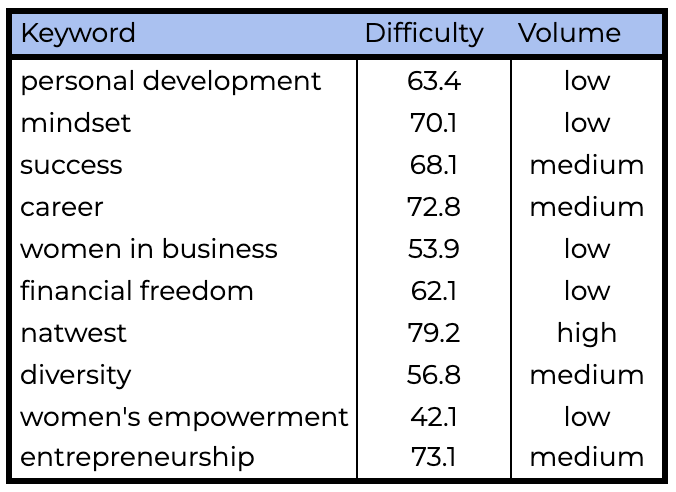
Based on these numbers, I would
- get rid of ‘mindset’ which is in the ‘stay away’ part of the quadrant
- get rid of ‘mental health’. It is only loosely related to careers in fintech and the competition is too fierce to hope for a quick win
- replace ‘career’ by ‘career advice’ which has a keyword difficulty of 56.1 and low volume. If we include ‘career advice’ in our metadata, then we automatically are in the race to rank for career too so why not kill two birds with one stone?
- replace ‘entrepreneurship’ by ‘female entrepreneurship’ which has a keyword difficulty of 57.2 for the same reason as above plus the fact that Moni’s target audience is female
Step 3: competitive research
Now that we’ve pruned our keyword set, we will try to find keywords located in the sweet spot of the quadrant to replace them. Checking what keywords other shows in her niche are already ranking for will help us uncover these low hanging fruits.
I don’t really know which podcasts are popular in this niche so I’m going to use Voxalyze to
- find out whom I’m competing against
- see what keywords my competitors and ranking for and harvest the low hanging fruits. By that I mean keywords with a relatively high search volume but a keyword difficulty below 80.
First I go to the keyword explorer and type fintech in the search bar
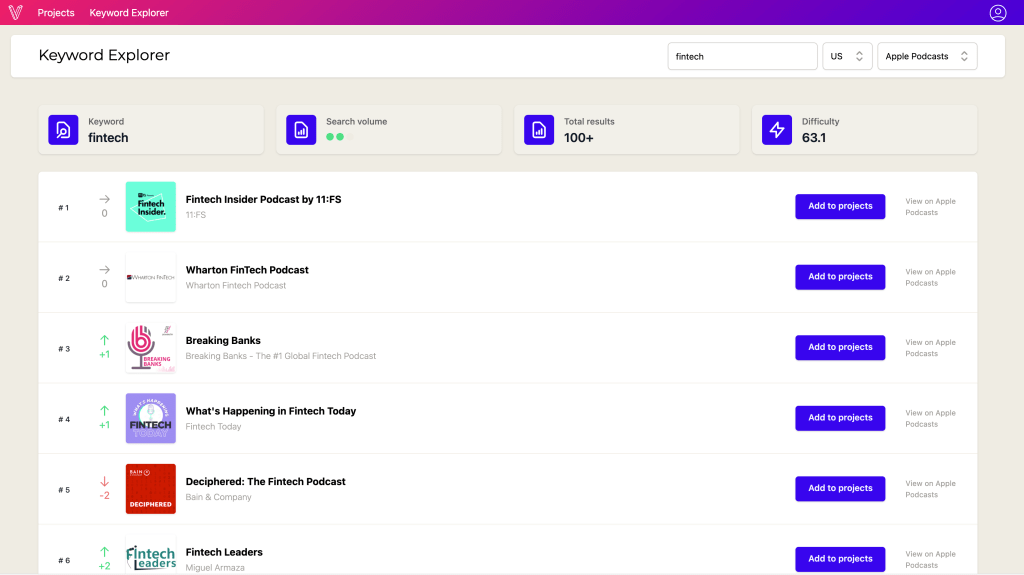
Next, I’m going to add the Fintech Insider podcast to my projects to find out what other keywords they rank for. I download the .csv file which I’m going to upload in this low-hanging fruits detector sheet I created (you need to click on File > make a copy in the top left corner to be able to use it)
I get this neat list where I can spot some juicy keywords that I can include in my show description and/or dedicate an episode to.
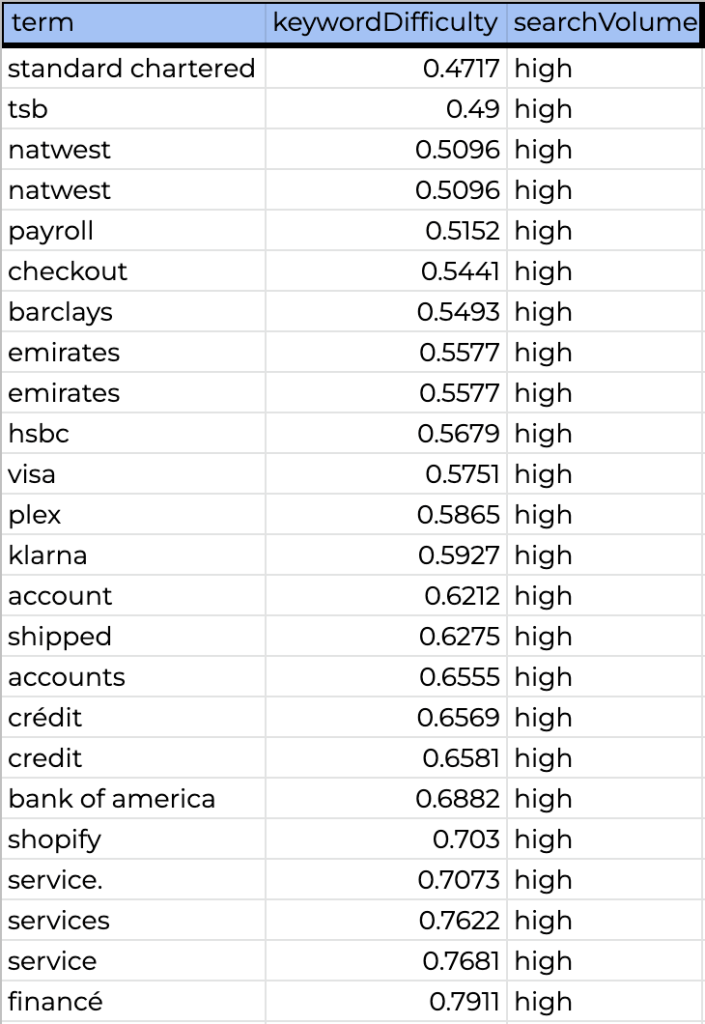
For the sake of this exercise, I’m going to pick ‘standard chartered’ and ‘natwest’ because they both have podcasts so we can try to piggyback on their existing search volume. If a listener types ‘natwest’ in the search bar on Apple Podcasts we will have a good chance to rank second.
That being said, I will let Moni decide and pick the 2 that best fit. Does she have enough to say about a certain topic to produce an episode around it? Is it topically relevant for her? One idea that comes to mind would be to invite guests working at some of the major financial institutions listed above.
If you still have spots to fill, you can repeat the competitive research process by:
- checking what keywords the show in position 2 ranks for
- changing the podcast platform to Spotify and checking what keywords the show in position 1 ranks for.
Step 4: checking Moni’s current rankings
Let’s open Voxalyze and add Moni’s show to my projects to see what keywords it’s already ranking for. I make sure to check rankings for both Spotify and Apple as these might vary quite a bit due to differences in how their respective algorithms work. Moni’s show is in English so I’m checking her rankings in the US, UK, and Australia.
💡 Why do rankings vary country by country? Podcast metadata is not the only factor that determines rankings. For instance, Apple will look at the number of reviews and these are counted locally.
Step 5: Gap analysis
I download the .csv file of keywords in Voxalyze and import it to this Google Sheet I created to perform what is called a gap analysis. In simple terms, we will compare Moni’s target keyword list with the keywords Mind of Success is actually ranking for.
Results:

As you can see, we have a long way to go but it’s not a bad thing. Few podcasters and media houses are aware of the impact of metadata on rankings and even fewer optimize correctly. This means that with the right metadata adjustments, Mind of Success can start ranking for these keywords. We will be sure to update this article as changes are implemented.
Step 6: Rewriting your metadata
First, you need to store your current metadata somewhere. Why? You need to keep a record to make sure you’re able to understand what impact a given change had.
I prefer to use a Google Sheet that includes the following columns:
- Date
- Tag
- Original copy
- New copy
- Keywords targeted
- Ranking at date of change
- New ranking
New title suggested: Mind of success – Fintech career advice for women
New author tag suggested: Moni Millares – Fintech career coaching
New show description: Show descriptions can be as long as 4000 characters. The current one is 600 characters long which is much higher than the industry average of 160 but can and should be expanded to include the missing keywords.
For more details on how to write your podcast metadata well, read our ultimate guide to podcast metadata optimization
FAQ
I rank for my target keyword on Spotify but not Apple. What can I do?
Apple’s algorithm works differently and tends to prioritize the author tag and number of reviews more than Spotify. Change your author tag to include your main keyword and get friends and family to leave reviews.
My competitor and I have the same keywords in our show title and description but they rank higher. Why is that?
It could be that the show you’re competing against has an edge (or a combination of them)
- higher number of streams/listeners
- higher number of reviews
- they used the keywords in episode titles as well contributing to the overall show relevance